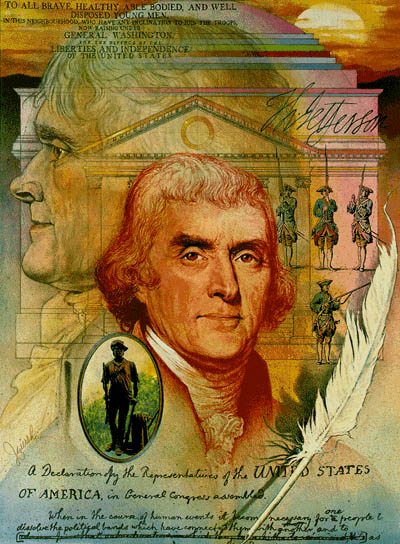"Everything predicted by the enemies of banks, in the beginning, is now coming to pass. We are to be ruined now by the deluge of bank paper. It is cruel that such revolutions in private fortunes should be at the mercy of avaricious adventurers, who, instead of employing their capital, if any they have, in manufactures, commerce, and other useful pursuits, make it an instrument to burden all the interchanges of property with their swindling profits, profits which are the price of no useful industry of theirs." - Thomas Jefferson to Thomas Cooper, 1814.
"The art and mystery of banks... is established on the principle that 'private debts are a public blessing.' That the evidences of those private debts, called bank notes, become active capital, and aliment the whole commerce, manufactures, and agriculture of the United States. Here are a set of people, for instance, who have bestowed on us the great blessing of running in our debt about two hundred millions of dollars, without our knowing who they are, where they are, or what property they have to pay this debt when called on."
"The treasury, lacking confidence in the country, delivered itself bound hand and foot to bold and bankrupt adventurers and bankers pretending to have money, whom it could have crushed at any moment…These jugglers were at the feet of government. For it was not, any confidence in their frothy bubbles, but the lack of all other money, which induced…people to take their paper" - Thomas Jefferson, October 1815 letter to (former) Treasury Secretary, Albert Gallatin.
"I own it to be my opinion, that good will arise from the destruction of our credit. I see nothing else which can restrain our disposition to luxury, and to the change of those manners which alone can preserve republican government. As it is impossible to prevent credit, the best way would be to cure its ill effects by giving an instantaneous recovery to the creditor. This would be reducing purchases on credit to purchases for ready money. A man would then see a prison painted on everything he wished, but had not ready money to pay for." --Thomas Jefferson to Archibald Stuart, 1786.
"If the debt which the banking companies owe be a blessing to anybody, it is to themselves alone, who are realizing a solid interest of eight or ten per cent on it. As to the public, these companies have banished all our gold and silver medium, which, before their institution, we had without interest, which never could have perished in our hands, and would have been our salvation now in the hour of war; instead of which they have given us two hundred million of froth and bubble, on which we are to pay them heavy interest, until it shall vanish into air... We are warranted, then, in affirming that this parody on the principle of 'a public debt being a public blessing,' and its mutation into the blessing of private instead of public debts, is as ridiculous as the original principle itself. In both cases, the truth is, that capital may be produced by industry, and accumulated by economy; but jugglers only will propose to create it by legerdemain tricks with paper." --Thomas Jefferson to John W. Eppes, 1813.
"The Bank of the United States is one of the most deadly hostilities existing, against the principles and form of our Constitution. An institution like this, penetrating by its branches every part of the Union, acting by command and in phalanx, may, in a critical moment, upset the government. I deem no government safe which is under the vassalage of any self-constituted authorities, or any other authority than that of the nation, or its regular functionaries. What an obstruction could not this bank of the United States, with all its branch banks, be in time of war! It might dictate to us the peace we should accept, or withdraw its aids. Ought we then to give further growth to an institution so powerful, so hostile?" --Thomas Jefferson to Albert Gallatin, 1803.


No comments:
Post a Comment